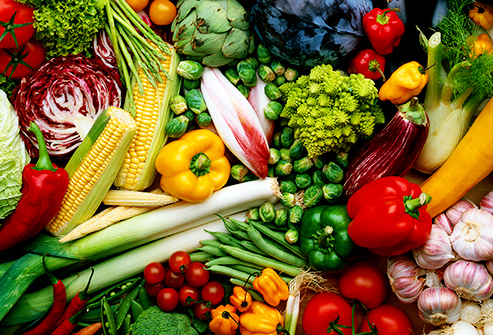Top 5 Health Benefits of Eating Vegetables

Eating vegetables provides health benefits – people who eat more vegetables and fruits as part of an overall healthy diet are likely to have a reduced risk of some chronic diseases. Vegetables provide nutrients vital for health and maintenance of your body.
The cost of eating vegetable, at least in Nigeria, is more affordable, compare to the cost of healing the wounds imbalance diet can cause. Eating plenty of vegetables is one of the easiest ways for people to improve their health and well-being (Dr. Jayne Leonard, 2018)

Common Vegetables
Here are Top 5 Benefits of Eating Vegetables
- Prevent Cancer: Eating a diet rich in some vegetables and fruits as part of an overall healthy diet may protect against certain types of cancers.
- Prevention of Chronic Diseases: Diets rich in foods containing fiber, such as some vegetables and fruits, may reduce the risk of heart disease, including heart attack and stroke, obesity, and type 2 diabetes.
- Skin care: Nature knows the best ways to keep us healthy, whether it is our organs, limbs, skin, or hair. The fruits and vegetables that we often tend to forget in our diet are the best treatment for bright, glowing, and healthy skin. The vibrant pigments in fruits and vegetables also have immense disease-fighting capabilities.
- Prevent Hypertension: Eating vegetables and fruits rich in potassium as part of an overall healthy diet may lower blood pressure, and may also reduce the risk of developing kidney stones and help to decrease bone loss.
- Weight Loss: Eating foods such as vegetables that are lower in calories per cup instead of some other higher-calorie food may be useful in helping to lower calorie intake. According to organicfact.net, it is a well-established fact that eating veggies is a healthy way to lose or maintain weight. In fact, vegetables are called ‘negative calorie foods’ because they actually help in weight loss by making you spend more energy to digest the food than add to your overall caloric intake.

Benefits of Vegetables: Source – organicfacts.net
If there anything I want to say today, it is as simple as saying, please eat vegetable.
If you love me and you, please eat enough vegetables because;
- Eating vegetables provides health benefits – people who eat more vegetables and fruits as part of an overall healthy diet are likely to have a reduced risk of some chronic diseases.
- Vegetables provide nutrients vital for health and maintenance of your body.
- Most vegetables are naturally low in fat and calories. None have cholesterol. (Sauces or seasonings may add fat, calories, and/or cholesterol.)
- Vegetables are important sources of many nutrients, including potassium, dietary fiber, folate (folic acid), vitamin A, and vitamin C.
- Diets rich in potassium may help to maintain healthy blood pressure. Vegetable sources of potassium include sweet potatoes, white potatoes, white beans, tomato products (paste, sauce, and juice), beet greens, soybeans, lima beans, spinach, lentils, and kidney beans.
- Dietary fiber from vegetables, as part of an overall healthy diet, helps reduce blood cholesterol levels and may lower risk of heart disease. Fiber is important for proper bowel function. It helps reduce constipation and diverticulosis. Fiber-containing foods such as vegetables help provide a feeling of fullness with fewer calories.
- Folate (folic acid) helps the body form red blood cells. Women of childbearing age who may become pregnant should consume adequate folate from foods, and in addition 400 mcg of synthetic folic acid from fortified foods or supplements. This reduces the risk of neural tube defects, spina bifida, and anencephaly during fetal development.
How does today’s topic go with you. Let me know how helpful this article is to you.
Leave a comment below and share with love ones.







